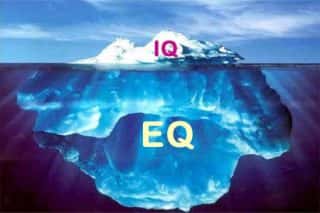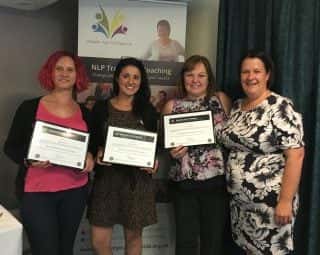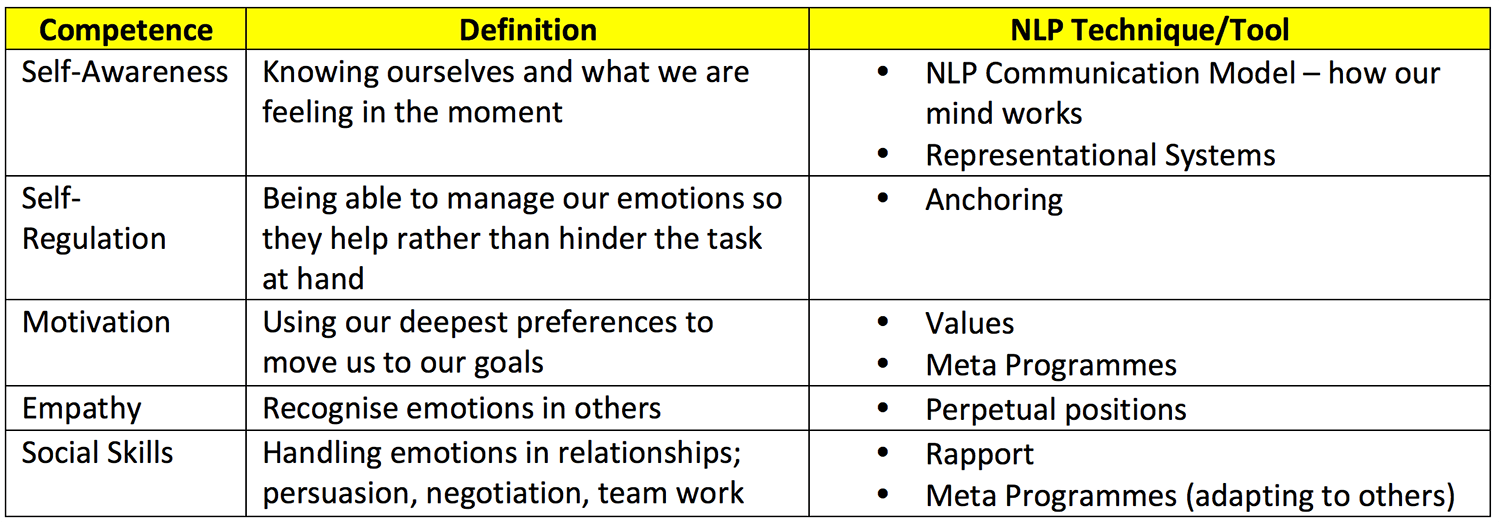Emotional Intelligence is key …
“Emotional intelligence is being able to recognise a wide range of nuanced emotions, and recognising them, being able to regulate them and put them in perspective in a way that helps the individual move through life more easily”. – Elisabeth Stitt, Author, Parent Educator and Coach.
Susan Jane from Intuitive Nature and Personal Growth Expo, adds: I come from a background that includes a 20 year emotionally abusive relationship. Thus, I needed to understand what emotions where, what they are about, and why we have them.
“I developed Emotional Intelligence the hard way like most of us; through trial and error. What feels emotionally good for one person may not have the same outcome to another. Gaining emotional intelligence about your own feelings is the first step. Learning more about YOU helps you know what you like and dislike. However understanding other people’s emotions and not taking them on board as your own is the true essence of Emotional Intelligence. Simply reacting and responding to other people’s emotions is NOT emotional Intelligence.”
Emotional Intelligence is now seen as a “need to have” ingredient for Leaders and Professionals world wide – ‘hard’/technical skills alone are not enough. Emotional Intelligence will be one of the top job skills in 2020 according to the World Economic Forum. In a survey of 2,600 Hiring  Managers and HR Professionals 71% of respondents said they valued Emotional Intelligence over IQ and 75% said they were more likely to promote an emotionally intelligent employee.
Managers and HR Professionals 71% of respondents said they valued Emotional Intelligence over IQ and 75% said they were more likely to promote an emotionally intelligent employee.
As Jessica Hodkinson, Social Media and PR Professional at Online PR Pixie, explains, “Emotional Intelligence is having the ability to recognise your own emotions and those of others around you. If you have a high EQ, you are more likely to understand what motivates individuals to do things, and how to empathise with them when they are seeking help.”
Christine Corcoran, a qualified Life Coach, Master NLP Practitioner and Matrix Therapies Practitioner at Periscope Coaching, adds: “Recognising where we control our reactions and thoughts, and ultimately choose our emotions from moment to moment, is an important part of building strong relationships with yourself and other people.”
“Emotional Intelligence is having an awareness of self and awareness of others, their emotions, and what the situation requires. Developing Emotional Intelligence will improve your work environment, home experience, improve your relationships and overall life experience.”
So, why has Emotional Intelligence had such as premium placed on it? – because it’s key to success…
Dr Salone Goodman is a medically trained hypnotherapist and psychotherapist based in the UK. She says: “It is vital for children and teens to be allowed to fully develop their Emotional Intelligence (EQ). Studies have proven that emotional intelligence is a strong predictor of future success in life. For example, students with high EQ’s have been found to achieve better results at school, make better choices about issues such as smoking and be more co-operative with their fellow students and teachers.”
“Without [emotional intelligence] a person can have the best training in the world, an incisive, analytical mind, and an endless supply of smart ideas, but he still won’t make a great leader” – Daniel Goleman
As Steve Kay, Managing Director at NLP UK Training, summarises: “They say that some people are good at Theory (IQ), while others are good at practical (EI). It is rare to have both.
“We all have a base IQ and EI, but if you look at most IQ tests, they are based on your ability to decipher theoretical problem solving. These problem solving abilities are improved as we get older and are given similar problems in school and life. I believe that this is similar to EI, many EI abilities are learnt through either experience or from others, and our ability to adapt and change as required.
“I believe that Emotional Intelligence is strongly associated with common sense and the ability to make judgements based on your surroundings. i.e. the ability to make intelligent decisions based on what you need to achieve, what you have been given and what you need to get and how you manage to achieve this. This is why many successful people in business are considered to have a high EI, as they can adapt to different situations and have business smarts, but the truth is that many times this is because they have had to learn the hard way and were about tot analyse their situation, adapt and learn from failure.”
Emotional Intelligence is very simple: some people are good with people, are self aware, able to manage their emotions and for others this is a challenge. There is much written about ‘what’ Emotional Intelligence is and ‘why’ it’s important, but less about ‘how’ to develop it – this is where Neuro Linguistic Programming (NLP) comes in to offer us tools, techniques and a mindset that is easy to understand and use in becoming more emotionally intelligent.
Nina Madden, the Founder of Nina Madden Ltd, says: “One way it is important to develop in Emotional Intelligence is to have the ability to reflect constructively on temporary emotional states, to be able to recognise ideally before (but if not) after, and learn to draw the vital information about ones self or their environment that has been in play. It is often signalling an unacceptable impact to ones wellbeing.
“The ability to recognise the presence of emotion and act intentionally comes from being really well grounded in self esteem self awareness, and practising self care daily. Examples of this include some reflection, yoga, prayer, and meditation.”
Of how EI can be used within a person’s interpersonal relationships, Jeff Withers from Love Dynamics Global, says: “in our work with clients over time, we have come to appreciate emotional intelligence is but part of the equation. In fact, for a successful (ongoing) relationship to exist requires both parties to also have a strong awareness of their own and their partner’s natural behaviours, and their talents, strengths and weaknesses, along with a knowledge and understanding of how they each engage and communicate the values and the passions that drive them day by day.
“With any of these missing, there is a lessened likelihood of any couple achieving a long-lasting and highly satisfying relationship together. However, when addressed together, they form the foundation from which enhanced engagement can grow.”
Deborah Fairfull from Blisspot shares some of the great benefits of developing Emotional Intelligence. As Blisspot explains: “Emotional Intelligence (EQ) is valuable as it helps you to:
1. Remain calm during challenging times.
2. Develop win/win scenarios when working with others because of your genuine empathy (hurting another would be like hurting yourself). It is always possible to find a win/win if you are prepared to take the time to work through mutually acceptable solutions and are committed to the outcome.
3. Lead by example, as you care about being congruent and authentic in your interactions with your team.
4. Be thoughtful in your decisions as you consider the good of the whole, rather than just the best outcome for yourself.
5. Be aware you have the ability to choose your emotions rather than your emotions choosing you, which can lead to you acting out in ways you later regret.”
“I believe that emotional intelligence and coaching are inseparable; that emotionally intelligent people tend to behave in a coaching way even if they have not attended a coaching course” – Sir John Whitmore, Founder, Performance Consultants International
How can we use NLP to build Emotional Intelligence?
“Emotional intelligence is a combination of five skill sets–some assessing how a person relates to him/herself (self-awareness, self-regulation, self-motivation), and others assessing how one relates to others (empathy, social skills)”. – Laurie Richards, Accomplished International Speaker.
Miriam Henke, a registered psychologist and Master NLP Practitioner, says of Emotional Intelligence: “Research in the field of Positive Psychology has particularly focused on Emotional Intelligence (EQ), which is essentially the ability to recognise, manage, and use your emotions in positive and constructive ways. It’s also about recognising the emotional states of others and engaging them in ways that feel good to all and create mutual safety, trust, and confidence. Emotional Intelligence includes:
“1. Self awareness or Emotional self-awareness: reading one’s own emotions and recognising their impacts, using “gut sense” or intuition to guide decisions;
“2. Accurate self-assessment – knowing one’s strengths and limits;
“3. Self-confidence – a sound sense of one’s self-worth and capabilities.
“Individuals with a high EQ are able to quickly and dependably bring stress levels into balance, can remain emotionally aware, and harness emotions. They are also able to effectively send and receive nonverbal cues, engage in joyous, playful activity with others, and resolve conflict in ways that build trust .
“Emotional Intelligence has been shown to be linked to success in life, as it facilitates improved, authentic relationship within and with others, including our bosses, colleagues, team members, clients, suppliers, family, and friends.”
According to Caroline McGuire (FCPHR), HR Specialist and Coach at Clariti Consulting, EI is different for each person. She says: “Emotional Intelligence definitely does vary across individuals. Some people are naturally more emotionally intelligent, and others have worked hard to develop their EI. Life experiences, our mindset and the way we learn from experiences will impact our emotional intelligence.”
Caron Margarete, Master Practitioner at Your Inner Mentor Results Coaching, agrees, adding: “The breadth and depth of our experiences with this knowledge are indicative of our assessment, along the gradient scale of emotional intelligence.”
However, as Martin Probst, the CEO (Chief Education Officer) of Profound Leadership, explains: “Emotional Intelligence is a skill that can be learned. The EQ (Emotional Quotient) can be developed by taking ownership of our own emotions, to enable us to enhance relationships and positively influence ourselves and others. It is the key to succeed in today’s busy and ever-changing environment.”
Below are some examples of how NLP can help us build Emotional Intelligence …
- Becoming more self aware – understanding how your mind operates as well as how our mood and emotional state (as well as our thoughts) impact our behaviour and results.
- Change your state/feelings in an instant! – NLP Anchoring allows you to recognise and move to a more resourceful mood/emotional state. We can also use our physiology to change our mood too!
- Understanding the role of Self-Talk – we all have an inner critical or cheer leader – with NLP we can change the internal chatter of the ‘inner critic’ so that our self talk doesn’t get in our way (for example by enabling us to remain emotionally aware of how we are acting and the impact we are having) – check our this blog as way of introduction.
- Creating new strategies to help you manage yourself better – Emotionally Intelligent people are aware of their internal pressure thermometer, have good coping mechanisms for stress and handling what life throws at them.
- Building Rapport is key to better communication and relationships at work – without rapport, there is no communication. Being a great listener is a trait of someone who has high levels of Emotional Intelligence – listening and being able to build real connections with people. On our NLP Courses, we teach you the 7 steps to building great rapport with anyone – even people you don’t like! (check out the first step here)
- Everyone has preferences – becoming aware of the different preferences people have is key – we use Meta Programmes to do this in NLP and then we can consider how we can tweak our communication or approach towards others in order to be be more effective.
- What motivates us – our Values are what motivate us and influence our actions. An understanding of Values can be used to motivate ourselves and others more effectively.
- Building Empathy – seeing things from another person’s point of view provides new insight. Using the NLP technique Perceptual Positions (which we teach on our NLP Business Diploma course), helps people to start to build empathy with others.
Kathy Fray, research Midwife at Auckland University and New Zealand’s best-seller author of “OH BABY … Birth, Babies & Motherhood Uncensored”, says of NLP: “Since the 1980s, NLP has had an enormous impact on the corporate world, but it can also be used in a family dynamic as well. Applications of NLP are wide and varied, but in general, the improvement in the way one thinks, feels, acts and learns can be used in a wide range of self-improvement avenues, including business, healthcare, sports and personal development.
“When taught in a fun, child-friendly way, NLP can be just as effective for children and teens, and can aid in increasing confidence, gaining motivation and improving communication skills, as well as helping with common childhood problems such as exam stress, low self-esteem and reversing negative attitudes.”
Jack Nedelchev, Current Health & Wellness Educator & Health Coach at Be Healthy, Wealthy, Wise, adds: “Emotional intelligence or EQ is being aware of exact emotions, with what intensity are running through our brain, how they are altering our behaviour and distorting our perception of reality, influencing our actions. One must be aware when emotions are affecting his decisions and refrain from the urge to act impulsively. The strong emotional state usually affects reason, and the ability to make logical rational decisions.
“NLP is bypassing that neurological process, and allowing verbal control of others over the decision making the process. Emotional intelligence is to recognise this status, handle the emotions and allow for reason to take over and complete the decision-making process. The assimilation of that emotions, both positive or negative can be negotiated and assimilated at a later, more convenient moment.”
NLP and Daniel Goleman’s 5 Basic Competencies
Some of you may be aware of Daniel Goleman has become a leading figure in Emotional Intelligence and created the 5 basic competencies. For those of you who have had some NLP training, below I have mapped some of the NLP Practitioner and Master NLP Practitioner course content directly against his 5 basic competencies in order to show the linkage between the two:
Build your Emotional Intelligence with an NLP Course
Are you interested in how emotions affect work performance? Do you struggle to manage your emotions at times? Would you like to communicate more effectively with others? Do you want to build great  relationships and make the most of your potential? Do you want to be able to understand what motivates others? Do you want to be able to build empathy more easily? Would you like to understand how to resolve conflict more effectively? and a host more …..
relationships and make the most of your potential? Do you want to be able to understand what motivates others? Do you want to be able to build empathy more easily? Would you like to understand how to resolve conflict more effectively? and a host more …..
You have loads of choices in terms of courses …
- NLP Business Diploma – a great 2 day introduction to NLP that gives you a number of the foundation skills that you can apply straight away in your business or career. No prior knowledge is required.
- Certified NLP Practitioner Course – this is an amazing 7 day personal development course that not only helps you build self-awareness and gives you the tools to help you build emotional intelligence, it also gives you the tools to be able to help others do the same too! No prior knowledge or experience is required because our comprehensive pre-course study covers all the basics so you can get the most from the course.
You can check out all our course locations & dates via our course schedule page.
You can contact us with any questions or to book via our contact us page, emailing us at [email protected] or by calling us on 02920 023311



